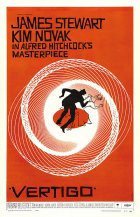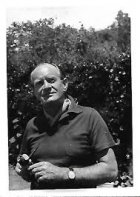
Vertigo
- PG
- Year:
- 1958
- 128 min
- 4,244 Views
EXT. SAN FRANCISCO ROOF TOPS - (DUSK) - CLOSE SHOT
We see a close view of a roof parapet and the curved rail of
a fire escape. In the bag, are large skyscrapers with all
their windows fully lit in the late winter afternoon. This
background is used for the CREDIT TITLES of the picture.
After the last card has FADED OUT, we HOLD on to the empty
parapet, when suddenly a man's hand reaches and grips the
top of the rail. It is followed by another hand and, after a
beat, we see the face of a man in his early 30's. He is an
Italian type, with rough features. He turns quickly and looks
below him and then turning back, springs up over the empty
parapet and is lost from view. We STAY on the EMPTY SCENE
for a second or two as we HEAR the scraping of boots on the
iron ladder. Someone else is coming up. Presently, two more
hands and the head of a uniformed policeman with cap and
badge starts to climb over the parapet. The CAMERA PULLS
BACK so that by the time he has completed his climb, he is
in full figure. He dashes out of the picture drawing his
gun. Immediately following him over the parapet, a detective
in plain clothes climbs over. This is JOHN FERGUSON, known
as SCOTTIE. He too pulls a gun and dashes out of the picture.
EXT. SAN FRANCISCO ROOF TOPS - (DUSK) - LONG SHOT
A vast panorama of the San Francisco skyline. Nearer to us
are three tiny figures running and jumping over the roof
tops. The man on the run, whom we first saw climb over the
parapet, is dressed in a white shirt and light tan linen
slacks, and wearing sneakers. The uniformed man is shooting
at him. Scottie is dressed in medium grey clothes. The CAMERA
SLOWLY PANS the group across the roof tops.
EXT. SAN FRANCISCO ROOF TOPS - (DUSK) - MED. SHOT
We now see a short gap between rooftops, with a drop below.
The pursued man makes the leap successfully followed by the
uniformed policeman. Scottie makes the same leap, but almost
trips in taking off and is thrown off balance. He tries to
recover, lands awkwardly on the opposite roof, and falls
forward, prone, with a heavy impact that hurts and drives
tile breath from his body. He tries to rise but raises his
head with a look of pain -- one leg is doubled up under the
other. The tiles give way, and he slides backwards, and his
legs go over the edge of the roof, then his body. In his
daze he grasps at the loose tiles, and as he goes over the
edge he clutches on to the gutter, which gives way, and he
swings off into space, looking down.
EXT. SAN FRANCISCO ROOF TOPS - (DUSK) - CLOSE SHOT
Scottie looking down.
EXT. SAN FRANCISCO ROOF TOPS - (DUSK) - LONG SHOT
From Scottie's viewpoint, the gap beneath the building and
the ground below. It seems to treble its depth.
EXT. SAN FRANCISCO ROOF TOPS - (DUSK) - CLOSEUP
Scottie looking down with horror. His eyes close as a wave
of nausea overcomes him.
EXT. SAN FRANCISCO ROOF TOPS - (DUSK) - MEDIUM SHOT
In the distance the fleeing criminal. The policeman, seeing
what has happened to Scottie, returns to the slope of the
roof and strains to reach down to Scottie.
POLICEMAN:
Give me your hand!
EXT. SAN FRANCISCO ROOF TOPS - (DUSK) - CLOSE UP
SCOTTIE'S HEAD. His hands grip the edge of the guttering.
The tips of the fingers of policeman straining to reach
Scottie, are at the top of screen. Scottie begins to open
his grip but stares down, he quickly resumes his grip looking
up hopelessly towards the helping hand. He looks down again.
FROM SCOTTIE'S VIEWPOINT - the ground below still a long way
away.
EXT. SAN FRANCISCO ROOF TOPS - (DUSK) - MEDIUM SHOT
The policeman's hand in foreground, his face beyond.
POLICEMAN:
What's the matter with you? Give me
your hand!
Policeman endeavors to stretch out his hand further.
EXT. SAN FRANCISCO ROOF TOPS - (DUSK)
The tiles beneath the policeman's heel begin to give. The
Policeman starts to slide. He claws desperately at the surface
of the roof.
EXT. SAN FRANCISCO ROOF TOPS - (DUSK) - CLOSEUP
Scottie, his eyes closed. He opens them as he hears a wild
cry.
EXT. SAN FRANCISCO ROOF TOPS - (DUSK) - LONG SHOT
The policeman falling through space.
EXT. SAN FRANCISCO ROOF TOPS - (DUSK) - CLOSEUP
Scottie stares down in horror.
EXT. SAN FRANCISCO ROOF TOPS - (DUSK) - LONG SHOT
The body of the policeman sprawled on the ground below.
People are running into the alleyway; they stare at the body,
look up to where Scottie is hanging. We see the light on
their upturned faces. And now we hear a police whistle blown
shrilly, again and again. Up to this moment the background
music has had an excitement to match the scene, and now it
cuts off, abruptly, leaving on the echo of the police whistle
as the DISSOLVE begins. Then, in the DISSOLVE, we hear the
gentle insistence of Scarlatti played by a chamber orchestra.
DISSOLVE TO:
INT. AN APARTMENT ON RUSSIAN HILL - (LATE AFTERNOON)
It is fresh, light, and simple, and crowded with books,
phonograph records, pictures. The most striking feature of
the apartment is the view: The rising hills of San Francisco
framed by a large picture window. To one side of the window
is the owner of the apartment, MAJORIE WOOD, called MIDGE,
at a commercial drawing table concentrating with professional
intensity on a drawing of a slim, a elongated woman with few
features and fewer clothes. A brassiere sits on a table at
Midge's elbow, and she studies it as she draws. Midge Wood
is about thirty-seven, attractive, straight-forward, well-
but-simply-dressed; she wears glasses but does not whip them
an and off as they do in the movies. The music comes from a
gramophone. The other occupant of the room is Scottie. He
sits in a big chair, with his feet stretched out on an ottoman
and his head far back. There is a drink on a table nearby.
He rouses himself to reach for it, and in doing so knocks
over his walking stick that has been propped against the
chair. He reaches out to catch it, and in the quickness of
trying to keep it from falling, he wrenches his body around.
SCOTTIE:
Ow!!
MIDGE:
(Paying little
attention)
I thought you said no more aches and
pains?
SCOTTIE:
It's this darned corset. It binds.
He retrieves the stick.
MIDGE:
No three-way stretch? How very un-
chic.
SCOTTIE:
Well, you know those police department
doctors:
no sense of style.(Sighs gratefully)
Ah, tomorrow!
MIDGE:
What's tomorrow?
SCOTTIE:
Tomorrow... the corset comes off.
And this thing goes out the window.
(He waves the stick)
I shall be a free man. I shall wiggle
my behind... free and unconfined.
He raises his eyebrows with a surprised and gratified smile.
Midge looks over at him with a grimace.
SCOTTIE:
Midge, do you suppose many men wear
corsets?
MIDGE:
More than you think.
SCOTTIE:
(Interested)
How do you know? Personal experience?
MIDGE:
Please!
(Then, impersonally)
And what happens after tomorrow?
SCOTTIE:
What do you mean?
MIDGE:
What are you going to do? Now that
you've quit the police force?
SCOTTIE:
(Gently)
You sound so disapproving, Midge.
Translation
Translate and read this script in other languages:
Select another language:
- - Select -
- 简体中文 (Chinese - Simplified)
- 繁體中文 (Chinese - Traditional)
- Español (Spanish)
- Esperanto (Esperanto)
- 日本語 (Japanese)
- Português (Portuguese)
- Deutsch (German)
- العربية (Arabic)
- Français (French)
- Русский (Russian)
- ಕನ್ನಡ (Kannada)
- 한국어 (Korean)
- עברית (Hebrew)
- Gaeilge (Irish)
- Українська (Ukrainian)
- اردو (Urdu)
- Magyar (Hungarian)
- मानक हिन्दी (Hindi)
- Indonesia (Indonesian)
- Italiano (Italian)
- தமிழ் (Tamil)
- Türkçe (Turkish)
- తెలుగు (Telugu)
- ภาษาไทย (Thai)
- Tiếng Việt (Vietnamese)
- Čeština (Czech)
- Polski (Polish)
- Bahasa Indonesia (Indonesian)
- Românește (Romanian)
- Nederlands (Dutch)
- Ελληνικά (Greek)
- Latinum (Latin)
- Svenska (Swedish)
- Dansk (Danish)
- Suomi (Finnish)
- فارسی (Persian)
- ייִדיש (Yiddish)
- հայերեն (Armenian)
- Norsk (Norwegian)
- English (English)
Citation
Use the citation below to add this screenplay to your bibliography:
Style:MLAChicagoAPA
"Vertigo" Scripts.com. STANDS4 LLC, 2025. Web. 21 Feb. 2025. <https://www.scripts.com/script/vertigo_1423>.







Discuss this script with the community:
Report Comment
We're doing our best to make sure our content is useful, accurate and safe.
If by any chance you spot an inappropriate comment while navigating through our website please use this form to let us know, and we'll take care of it shortly.
Attachment
You need to be logged in to favorite.
Log In